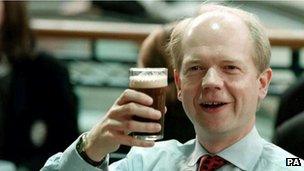Parliamentary sessions curtailed by change in drinking culture
- Published

William Hague's famous boast he had drunk up to 14 pints a day as a teenager generated scorn
Eric Joyce's admission that he assaulted four politicians in a Commons bar is just the latest episode in the colourful history of Parliament's watering holes, which have fuelled gossip, killed careers and occasionally broken out in song.
Clement Atlee knew that subsidised alcohol, late-night sittings, absent families, thwarted ambition and boredom can make a dangerous brew. His advice to new Labour MPs was simple: stay out of the bars.
But for decades before and since, MPs have ignored his warning, preferring to drink their way through Westminster life in the convivial comfort of its numerous saloons. The Houses of Parliament has the feel of a cruise ship, with different watering holes for its various passengers branching off the carpeted corridors.
There's the Smoking Room, the traditional haunt for Tory drinkers but where a corner was kept for Nye Bevan. There's a Bishops' bar, a Lords bar and a press bar where Neil Kinnock used to lead renditions of Cwm Rhondda.
Annie's bar is no more and politicians and journalists now lubricate their gossip in the Strangers' Bar. It used to be known as the Kremlin because it was where Labour MPs and trade unionists went to sink ales from the North East.
It's seen many a drunken skirmish over the years and there was once a little arrow nailed to the wall two inches off the floor - directions for MPs who were crawling out on their hands and knees.
Culture change
And on a warm summer's evening MPs can be seen burbling with contentment on the Commons terrace. From there, the former SDLP MP Gerry Fitt used to wave great glasses of gin and tonic to the passengers on passing pleasure boats saying, "It's free, it's all free!"
It was after a heavy session on the terrace in the summer of 2010 that the new Conservative MP Mark Reckless hit the headlines and had to apologise for missing an early morning vote on the Budget.
There is a long history of drinking in Parliament. In 1666, Pepys's diary records a pair of drunk MPs causing chaos in the Commons.
Three hundred years later Lord Owen had to revive an MP who had collapsed from drink, and over the years successive Speakers have battled to bring order to a late-night Commons chamber filled with boisterous, boozy MPs.
But it's not all convivial bonhomie. Drink has killed off the careers of prominent politicians such as George Brown and Charles Kennedy and has caused the deaths of several MPs.
Last year the new Conservative MP and former GP Sarah Wollaston said the drinking culture she had witnessed in Westminster needed to change: "Who would go to see a surgeon who had just drunk a bottle of wine at lunchtime? But we fully accept that MPs are perfectly capable of performing as MPs, despite some of them drinking really quite heavily."
Until the early 1990s it was a common sight to see MPs sliding down the walls during a late-night sitting. The bars were the refuge for the bored backbencher. But in the last 20 years the political drinking culture has changed.
Damage of drink
"Red or white?" used to be the traditional way to start a Westminster lunch. Now the dining journalist and politician are likely to restrict themselves to, "Still or sparkling?". The boozy lunch has largely gone, and so has widespread heavy drinking among Members of Parliament.
Today, pop into their office block in Portcullis House to see the professional politicians tapping away on their iPads and knocking back lattes. The working life of an MP has changed and sobriety in the Commons has increased.
Politicians I've spoken to in researching my book say it's down to shorter working days, fewer late-night sittings, more women in Parliament and greater awareness of the damage drink can do.
There was a time when a drunk MP would not have been newsworthy, when the masonic understanding between political journalists and their parliamentary contacts could have kept it quiet. Not today.
Ben Wright is writing a book on the history of politics and alcohol to be published later this year.
- Published12 March 2012
- Published2 February 2012
- Published11 July 2010